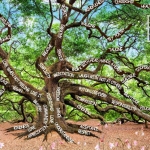“Imagine what we can do if 100,000 people decide to donate $3 a month (just 10 cents per day) for 12 months? It could transform the lives of thousands of children and their families. Is this too much to ask?”
 It is a sad commentary on our civilization that millions of children all over the world are denied basic amenities like, food, shelter, clothes and education. If civilization is measured by the way it treats its children then we are far from being a civilized society.
It is a sad commentary on our civilization that millions of children all over the world are denied basic amenities like, food, shelter, clothes and education. If civilization is measured by the way it treats its children then we are far from being a civilized society.
In the almost eighty years of my life I have seen poverty in Africa, Asia and the United States but the tragedy of this state of affairs hit me when a few years ago I ran into a five year old boy, grossly malnourished, dirty and dressed in rags. He was on a commuter train in Mumbai pleading with me to buy some candy that he carried in a little tin box.
I was intrigued that this little kid was hopping on and off trains something I wouldn’t have allowed my five year old to do. His story was pathetic.
 Every morning he was sent out of their shanty with a tin full of home made candy with strict instructions to sell them all and bring the money home if he wanted food to eat. If he did not bring enough he did not get anything to eat. When I met him it was almost six in the evening and he still had half a tin full of candy. No wonder the kid was emancipated.
Every morning he was sent out of their shanty with a tin full of home made candy with strict instructions to sell them all and bring the money home if he wanted food to eat. If he did not bring enough he did not get anything to eat. When I met him it was almost six in the evening and he still had half a tin full of candy. No wonder the kid was emancipated.
I could have bought the tin of candies and saved his day but what would he do after that. It was around this time that I met Ms. Anuradha Bhosale in Kolhapur, 300 miles south of Mumbai in India. She was doing just what I wanted to do and so we decided to partner and support each other.
 I came back to the US and along with friends we established the Gandhi Worldwide Education Institute to raise money to save and shelter children threatened by poverty, prostitution and child slavery.
I came back to the US and along with friends we established the Gandhi Worldwide Education Institute to raise money to save and shelter children threatened by poverty, prostitution and child slavery.
The program that we conceived is more ambitious than that. Rescuing children and giving them education would only alienate them from their families. My experience is that children become ashamed of the poverty in which their parents live and so they abandon them breaking up the family unit. This is counter-productive. Eventually the plan is to rescue the entire family and give the family the means to break out of poverty.
Keeping the family intact is very important.
Of course, none of this can happen without all of us pooling our resources together. We not only need expertise, and volunteer help but also money. A few years ago I was at a middle school in Portland, Oregon, where I spoke to the children about the plight of the kids I had met in India. The children asked, what can we do? I suggested that they save a little of the pocket money and create a fund. It was an off the cuff response and I did not expect much.
I was amazed that not only the children of the whole school saved some of their pocket money but also held bake sales and, along with their teachers, found other ways of raising some money and within a few months sent me a check for more than $4000. If children can do this surely as adults we can do better.
Imagine what we can do if 100,000 people decide to donate $3 a month (just 10 cents per day) for 12 months? It could transform the lives of thousands of children and their families. Is this too much to ask?






Speak Your Mind